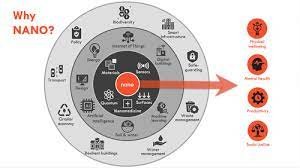Foundation Program on Nano Science and Technology

In the ever-evolving landscape of science and technology, the field of nanoscience and nanotechnology stands out as a frontier with immense potential. With the ability to manipulate matter at the nanoscale, scientists and engineers are poised to revolutionize industries ranging from healthcare to electronics. Recognizing the significance of this emerging discipline, numerous educational institutions have introduced foundation programs aimed at providing students with a strong fundamental understanding of nanoscience and technology. In this article, we delve into the intricacies of such foundation programs, their objectives, curriculum, and the impact they are poised to have on the future of technology.
Understanding Nanoscience and Technology:
Before delving into the specifics of foundation programs, it’s essential to grasp the essence of nanoscience and technology. At its core, nanoscience deals with the study of phenomena and manipulation of materials at the nanoscale, typically ranging from 1 to 100 nanometers. This scale is incredibly small, often comparable to the size of atoms and molecules. Nanotechnology, on the other hand, involves the application of knowledge gained from nanoscience to create new materials, devices, and systems with novel properties and functionalities.
Objectives of Foundation Programs:
Foundation programs on nanoscience and technology aim to equip students with a solid understanding of the principles, techniques, and applications of this burgeoning field. These programs serve as a stepping stone for students who aspire to pursue advanced degrees or careers in nanotechnology-related industries. The overarching objectives of such programs include:
- Building a Strong Foundation: These programs lay the groundwork by introducing students to key concepts in physics, chemistry, and biology relevant to nanoscience. They provide a comprehensive understanding of the fundamental principles governing the behavior of matter at the nanoscale.
- Fostering Interdisciplinary Learning: Nanoscience and technology are inherently interdisciplinary fields, drawing upon concepts from physics, chemistry, biology, materials science, and engineering. Foundation programs encourage students to explore diverse disciplines and develop a holistic understanding of nanotechnology.
- Hands-on Experience: Practical experience is integral to grasping the intricacies of nanoscience and technology. Foundation programs often incorporate laboratory sessions, where students gain hands-on experience with state-of-the-art equipment and techniques used in nanoscale research and fabrication.
- Promoting Critical Thinking and Problem-Solving Skills: Nanotechnology presents complex challenges that require innovative solutions. Foundation programs nurture students’ analytical skills, encouraging them to think critically and creatively to address real-world problems in nanoscience and technology.
- Ethical and Societal Implications: As with any emerging technology, nanoscience and technology raise ethical, environmental, and societal concerns. Foundation programs provide opportunities for students to explore these issues and develop a nuanced understanding of the ethical implications of their work.
Curriculum Highlights:
The curriculum of foundation programs on nanoscience and technology typically encompasses a diverse range of subjects tailored to provide students with a comprehensive understanding of the field. While specific courses may vary across institutions, common topics covered in these programs include:
- Introduction to Nanoscience and Nanotechnology: An overview of the history, principles, and applications of nanoscience and technology, including a discussion of nanomaterials, nanoelectronics, and nanomedicine.
- Fundamentals of Physics and Chemistry: Basic principles of quantum mechanics, thermodynamics, and chemical bonding relevant to nanoscale phenomena.
- Characterization Techniques: Introduction to experimental techniques for characterizing nanomaterials, such as scanning electron microscopy (SEM), atomic force microscopy (AFM), and X-ray diffraction (XRD).
- Nanomaterials Synthesis and Fabrication: Methods for synthesizing and manipulating nanomaterials, including top-down and bottom-up approaches, chemical vapor deposition, and self-assembly techniques.
- Nanodevices and Applications: Exploration of nanoscale devices and their applications in fields such as electronics, photonics, energy storage, and biomedicine.
- Safety and Ethics in Nanotechnology: Discussion of safety protocols, environmental impact, and ethical considerations associated with the development and implementation of nanotechnology.
- Research Projects and Internships: Opportunities for students to engage in hands-on research projects or internships under the guidance of faculty members or industry experts, allowing them to apply their knowledge in real-world settings.

Impact and Future Prospects:
Foundation programs on nanoscience and technology play a pivotal role in shaping the future landscape of science and technology. By nurturing a new generation of scientists and engineers equipped with the knowledge and skills to tackle complex nanoscale challenges, these programs are poised to drive innovation and propel advancements across various industries. The impact of such programs extends beyond academia, influencing the development of cutting-edge technologies with transformative potential.
As nanotechnology continues to evolve, the demand for skilled professionals in this field is expected to grow exponentially. Graduates of foundation programs are well-positioned to pursue diverse career paths, including roles in research and development, manufacturing, healthcare, and entrepreneurship. Moreover, the interdisciplinary nature of nanoscience and technology opens doors to collaboration across different disciplines, fostering cross-pollination of ideas and driving interdisciplinary innovation.
In conclusion, foundation programs on nanoscience and technology represent a crucial investment in the future of science and technology. By providing students with a solid foundation, hands-on experience, and a holistic understanding of nanotechnology, these programs empower them to become catalysts for innovation and change. As we stand on the brink of a nanotechnological revolution, the importance of such programs in shaping the future cannot be overstated.
